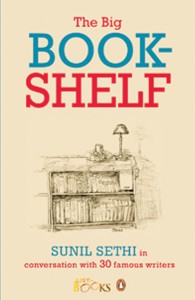— Ajit Baral
In February 2005 Sunil Sethi, a journalist, columnist and television presenter, started a weekly program on NDTV called ‘Just Books’, in which he interviews famous writers. He has interviewed over three hundred writers so far. Some of these interviews’thirty, to be precise’have been collected in this beautifully produced book, ‘The Big Bookshelf.’
Many of these writers are literary heavy weights including Gunter Grass, Nadine Gordimer and Salman Rushide; others are the finest exponents of crime fiction such as Ken Follet, Jeffry Archer and Alexandar McCall Smith; others still are the immensely popular writers of the cheap and not chick-lit kind including Chetan Bhagat and Shobhaa De. Engaging the authors on topics such as the craft of writing and why they set out to write, Sethi’s interviews provide a rare insight into the lives of literary greats.
Anita Desai, a writer who twice narrowly missed receiving the Man Booker Prize, reveals during her interview, for example, that:
‘I was a wife and a mother and writing was not what I was supposed to be doing. I had to do it in hiding. I remember I used to scribble away when the children were at school or playing downstairs and quickly put everything away before they came back in. My children always remark that they never saw me writing. And the book would one day appear, as though it just happened, it came from somewhere else.’
Glimpses, such as Anita’s, of the struggles and successes of writing are littered throughout the interviews that make up ‘The Big Bookshelf.’ Interesting to for book lovers and inspirational for aspiring writers who don’t know where to start; this is one title that is a great addition to any big bookshelf.
However, some readers may feel as if they are tucking into an unripped fruit which isn’t quite there yet. That has more do with the fact the collected interviews are the transcripts of a 30-min television program. Being short, the program does not provide time enough for Sethi to tease out more answers from the writers, which would giving the interviews a more-rounded feel. Unlike the ‘Paris Review’ Sethi fails to engage fully with the writer’s oeuvre, often skirting more informed context based questions. Similarly, being a television program having a different’and dare I say, a less bookish’ audience, the program skims over fundamental questions about the craft of writing. Inquiries about a texts plot, writing style, technique, characterization and pace are replaced instead with peripheral and controversial questions such as the break up between Salman Rushdie and his former flame, Padma Laxmi.
These shortcomings notwithstanding, you will find the book interesting’that is, if you are not used to reading ‘Paris Review’ and ‘Wasafiri’ interviews, which are more engaging.

